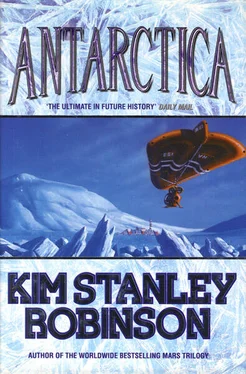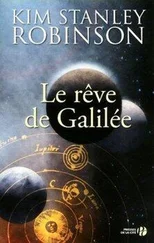Suddenly there were wild shouts from down the ridge. George and Ann-Marie were standing next to the snowy hump Val had picked out as the likely site.
“Show time,” Elliot declared, and hefted his camera pack. “I hope this baby stays warm enough to keep its focus.”
George had Elliot and Geena and the other camera operators shoot him and Ann-Marie re-enacting the rediscovery of the hut, their shouts thin compared to the happy triumph of the originals. Then they tromped back down to the dining tent, and ate the happiest meal they had had so far, while Val set up the rest of the sleeping tents. After that they slept through the long dark hours of the night, snug in their ultrawarm sleeping bags, on their perfectly insulated mattress pads. By the first glow of twilight on the next day they were all back on the ridge and working around the mound, some of them carefully clearing ice and snow away from the stacked rocks with hot-air blowers and miniature jackhammerlike tools, the others building a little wooden shelter just up the ridge; for they were there to undo the work of Edmund Hillary, so to speak, and return all of the belongings of Wilson’s group that Hillary and his companions had found and taken away.
The rock shelter itself was a small oval of rough stacked stones, many of them about as heavy as a single person could lift. The old boys had been strong. The wall at its highest was three or four rocks tall. The interior would have been about eight feet by five. The old boys had been small. They had put one of their two sledges over the long axis of the oval, then stretched their green Willesden canvas sheet over the sledge, and laid the sheet as far over the ground as it would go, and loaded rocks onto this big valance, and rocks and snow blocks onto the roof itself, until they judged the shelter to be as strong as they could make it. Bombproof; or so they had thought. A small hole in the lee wall had served as their door, and they had set up their single Scott tent just outside this entryway, to give them more shelter while affording the tent some protection from the wind, Val assumed; Wilson’s reason for setting up the tent when they had the rock shelter had never been clear to her. Anyway, the shelter had been pretty damned strong, she could see; the wind that destroyed it had not managed to pull the canvas out of its setting, but had instead torn it to shreds right in its place. As she had on her previous visits, Val kneeled and dug into the snow plastering the chinks in the wall, and found fragments of the canvas still there in the wall, more white than green. “Wow.”
And looking at the frayed canvas shreds, Val again felt a little frisson of feeling for the three men. It was like looking at the gear in the little museum in Zermatt that Whymper’s party had used in the first ascent of the Matterhorn: rope like clothesline, shoes, light leather things, with carpenter’s nails hammered into the soles…. Those old Brits had conquered the world using bad Boy Scout equipment. Like this frayed white canvas fragment between her fingers. A real piece of the past.
Not that they didn’t have a great number of other, larger real pieces of the past, there with them now to return to the site. For Wilson and his comrades had left in a hurry. The storm that had struck them had first blown their tent away, and then blown the canvas roof off their shelter; after that they had lain in their sleeping bags in a thickening drift of snow for two days, the temperatures in the minus 50s, the wind-chill factor beyond imagining—singing hymns in the dark to pass the time, although with their tent gone they were doomed, with no chance at all of getting back to Cape Evans alive. So when the wind had abated enough to allow them to stand, and they had gotten up and wandered around in the dark, and miraculously found their tent at the foot of the ridge, stuck between two boulders like a folded umbrella, they had carried it to their shattered camp and packed what they could find into one sledge and left immediately, in a desperate retreat for their lives. Thus began the third and worst stage of the Worst Journey, when they had hauled the sledge asleep in their traces, and slept in sleeping bags that had become nothing more than bags of ice cubes, which were nevertheless warmer than the air outside.
So when Hillary and his men had come on the site forty-six years later, they had found a lot of gear scattered about. They had collected it all up and put it in their farm tractors, and taken it all back with them to Scott Base at the other end of Ross Island; eventually it was all taken back to New Zealand, where the items were distributed to a number of Kiwi museums. Cherry-Garrard, still alive at the time, had written from England to approve this recovery and disposal of the gear, although since it had already been done when he was asked about it, he might very well have felt there was little else he could say. Val suspected that he had been the kind of person who would not complain about something when it could make no difference; and he certainly wanted his two long-dead comrades remembered as much as possible—not realizing that his book was so much greater a memorial to them than any objects in museums, that it would end up inspiring many people every year to return to Cape Crozier itself. And yet find there at the site only the emptied rock shell.
George Tremont had at some point come to feel that this removal of gear from the site had been a grave mistake. George was a Kiwi, and during a season’s film work at Scott Base, which included a few visits to Cape Crozier, he had become convinced that all the objects taken from the site—“looted,” he would say privately after a few glasses of warm Drambers, “vandalized; plundered” —ought to be returned and replaced. In other places around the globe one had these kind of inspired ideas in the bar and then sobered up the next day and dismissed them. But there was something about Antarctica that fueled obsessions, that created all manner of idées fixes which then took over whole careers and lives. The ice blink, some called it. Roger Swan, for instance, sitting in a college movie theater watching Scott of the Antarctic , had thereafter devoted his life to repeating Scott’s journey, an unlikely enough reaction one would have thought to a tale of continuous grim suffering; but the idea had obsessed him, and the Footsteps movement had been born.
And George had become the same way about the Cape Crozier artifacts. He had labored for ten years to argue all the relevant authorities over to his side—ten full years, like a bureaucratic Iliad and Odyssey combined, involving New Zealand’s Antarctic Heritage Trust (which George had joined and become president of before announcing his plan), the Historic Sites Management Committee of the Ross Dependency Research Committee, the New Zealand Antarctic Society, the Antarctic Treaty committee concerned with historic sites, the UN’s World Heritage Site committee, and scores of other societies, government agencies, university departments, and museum boards all over the world. The agreement of the Canterbury Museum in Christchurch had been the critical battle won, as they were in possession of the majority of the artifacts; this agreement had taken the advocacy of the Prince of Wales himself, but after that convincing everyone else had become progressively easier, as there grew more and more muscle to bring to bear on any little Kiwi museum that did not want to part with its relic of the holy crusade. Even Sir Edmund Hillary had eventually written a letter in support of the idea of returning the objects to the site, turning out to be as agreeable as Cherry-Garrard had been earlier. So in the end George had gotten all of the items donated back, and had also gotten permission to build a small wooden shelter to hold them, located nearby (“but out of photo range,” Elliot noted), and modeled on the old meteorological instrument shelter standing on Windvane Hill over the Cape Evans hut, on the other side of the island.
Читать дальше











